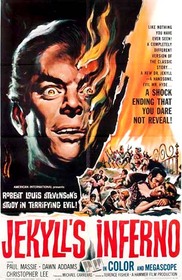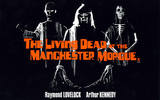Our editor-in-chief Nate Yapp is proud to have contributed to the new book Hidden Horror: A Celebration of 101 Underrated and Overlooked Fright Flicks, edited by Aaron Christensen. Another contributors include Anthony Timpone, B.J. Colangelo, Dave Alexander, Classic-Horror.com's own Robert C. Ring and John W. Bowen. Pick up a copy today from Amazon.com!
The Two Faces of Dr. Jekyll (1960)
Of all of the lists of “classic movie monsters,” Dr Jekyll/Mr. Hyde is the monster most forgotten. Maybe because the plot is entirely too similar to the far superior Wolf Man, or perhaps because there is only so many ways you can rehash such a simplistic tale. Of the many versions of the tale, the only two that stand out as truly unique are both from Hammer – Dr. Jekyll and Sister Hyde, and The Two Faces of Dr. Jekyll. The Two Faces of Dr. Jekyll is the far superior version, and could well possibly be the most emotional version of the story ever made.
In this rendition, Dr. Jekyll and Mr. Hyde are somewhat reversed. Traditionally, Dr. Jekyll is the socially revered man while Mr. Hyde is the murderous beast who slays under the guise of darkness. In this version, Dr. Jekyll is a hopeless social recluse who has a wife who cheats on him and a gambling addicted friend (played by Christopher Lee) who hounds money off of him when he is not shacking up with Jekyll’s wife. While concocting an experiment to learn the depths of the human mind, Jekyll turns into Mr. Hyde. Unfortunately Mr. Hyde is no longer an undesirable monster, but a handsome social butterfly who is capable of getting women most men wouldn’t dare approach. Oh, and he murders people too. Well, you know, we all have faults, right?
And this is where I have to praise the writers of this film. Traditionally, Dr. Jekyll and My Hyde were very clearly good vs. evil, and you were always rooting for Jekyll to beat the evil Hyde in the end. In this film, while Hyde is still clearly the evil one, you can not necessarily root for Jekyll to win because there are significant cons for either side. And suddenly the movie turns into a philosophical argument. What would really be worse? Spending life as a pathetic Recluse who always has the guilt of Hyde’s murders weighing on him? Or living as Hyde, the King of the Nightlife with infinite number of women, friends, and social engagements yet has no consideration for human life? Either ending is bound to be tragic, which is why this version is much deeper than its predecessors since it requires you to be much more emotionally invested in whichever side ends up victorious.
Also, as a special treat for Hammer fans, Christopher Lee plays a role very uncharacteristic of him. Though I believe Peter Cushing and Lee are equally talented actors, Hammer definitely showcased Cushing’s diversity more as he played everything from the pious holy man to the heroic van Helsing to the evil mad scientist. Lee almost always played some version of evil, which is why his role in The Two Faces of Dr. Jekyll was very nice to see. He played the slimy romantic love interest of Jekyll’s unfaithful wife, and did so remarkably. It was nice to see him playing someone somewhat vulnerable (at least financially, as was the case here), instead of larger-than-life-evil-being. This is definitely a great view for Lee fans as it starts to show off his range of talent.
The one detriment is that Paul Massie’s acting seemed a bit inconsistent. He played Jekyll much like Eeyore, which worked until he got so pathetic that you couldn’t blame his wife for her extracurricular activities. His version of Hyde was much better and only a couple points did I have to cringe at the blatant overacting. But whatever faults he had were made up for almost completely by the magnificent stage presence of Dawn Addams. She reminded me of an evil Bond girl -- sweet, demure, but powerful. Her character often switched between “the one who wore the pants in the family” (with Jekyll) to “meek female” (with Hyde), and she handled the change beautifully. I could believe almost anything that was coming out of her. She complimented Christopher Lee, and the scenes where Lee and Addams profess their love to each other are some of the most powerful scenes in the movie.
An often forgotten Hammer masterpiece, The Two Faces of Dr. Jekyll brings an interesting twist to a very simple tale. You have Christopher Lee in an atypical role, a great philosophical argument, and a film that makes an overdone story seem brand new again. There’s not much to complain about in this film, and you just may find yourself putting it at the top of your Dr. Jekyll/Mr. Hyde movie rankings.








